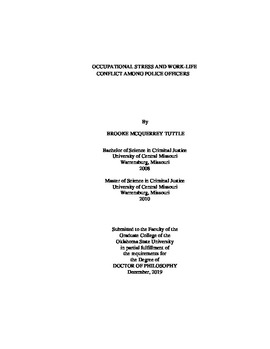| dc.contributor.advisor | Merten, Michael | |
| dc.contributor.author | Tuttle, Brooke McQuerrey | |
| dc.date.accessioned | 2020-04-09T19:48:16Z | |
| dc.date.available | 2020-04-09T19:48:16Z | |
| dc.date.issued | 2019-12 | |
| dc.identifier.uri | https://hdl.handle.net/11244/323824 | |
| dc.description.abstract | Stress from police work carries negative implications for the physical and psychological wellness of officers and consequences for their work-life interface to include relationships with family and friends. The ways in which officers respond to, and manage, occupational stress influences their overall wellbeing. The present research used data from Phase 1 of the National Police Research Platform to examine the relationship between use of humor as a coping strategy in the context of the police academy and emotional distress among police recruits from a transactional view of stress and coping. Additionally, the present research examined how the manifestation of occupational stress, through physical stress symptoms and psychological burnout, impacts life outside of work for officers from a stress spillover perspective. | |
| dc.description.abstract | Results from the first study indicated that police recruits use humor as a coping strategy at greater levels upon academy completion compared to their use of humor at the beginning of academy training. Additionally, results showed that greater levels of using humor as a coping strategy in the police academy predicted lower emotional distress upon academy graduation for recruits. Findings from the second study showed that higher levels of physical stress symptoms and psychological burnout were associated with higher levels of work-life conflict for police officers. | |
| dc.description.abstract | The present work adds to existing knowledge of police stress and coping by linking humor with lower levels of emotional distress among police recruits during academy training, thereby providing evidence that humor used during the stressful academy experience can be adaptive for police recruits and their emotional wellness. Findings from the present work also established a relationship between physical stress symptoms experienced by officers, psychological burnout, and their influence on officers' relationships with family and friends outside of work, lending support for the stress spillover hypotheses. Implications for officers, police organizations, law enforcement families, and communities are discussed. Prevention and intervention approaches are recommended to include psychoeducational programming on police stress and the adaptive benefits of humor, as well as clinical support for officers and their families. | |
| dc.format | application/pdf | |
| dc.language | en_US | |
| dc.rights | Copyright is held by the author who has granted the Oklahoma State University Library the non-exclusive right to share this material in its institutional repository. Contact Digital Library Services at lib-dls@okstate.edu or 405-744-9161 for the permission policy on the use, reproduction or distribution of this material. | |
| dc.title | Occupational stress and work-life conflict among police officers | |
| dc.contributor.committeeMember | Gardner, Brandt | |
| dc.contributor.committeeMember | Bishop, Alex | |
| dc.contributor.committeeMember | Croff, Julie | |
| osu.filename | Tuttle_okstate_0664D_16536.pdf | |
| osu.accesstype | Open Access | |
| dc.type.genre | Dissertation | |
| dc.type.material | Text | |
| dc.subject.keywords | burnout | |
| dc.subject.keywords | coping | |
| dc.subject.keywords | humor | |
| dc.subject.keywords | law enforcement wellness | |
| dc.subject.keywords | police stress | |
| dc.subject.keywords | work-life conflict | |
| thesis.degree.discipline | Human Sciences | |
| thesis.degree.grantor | Oklahoma State University | |
